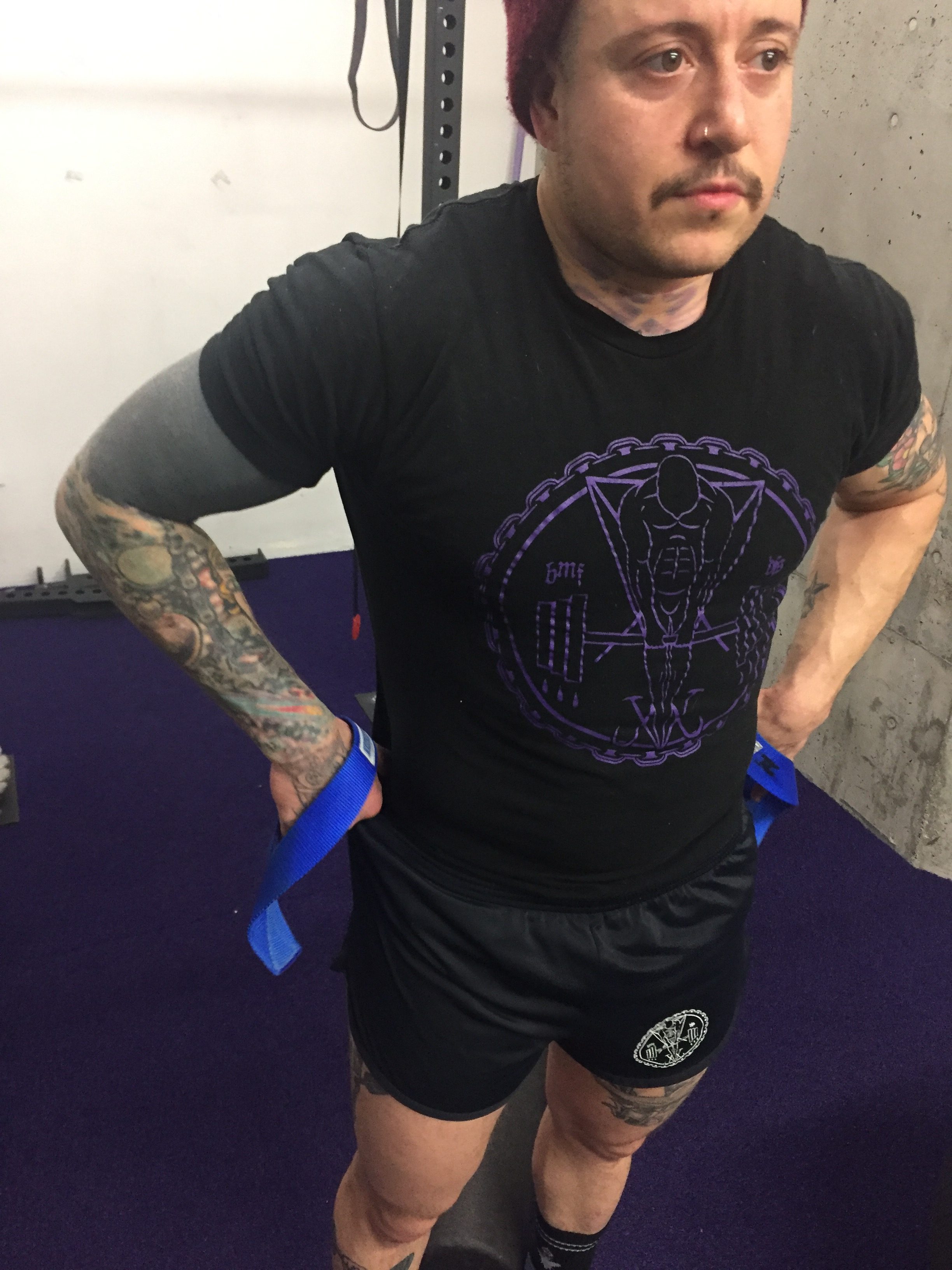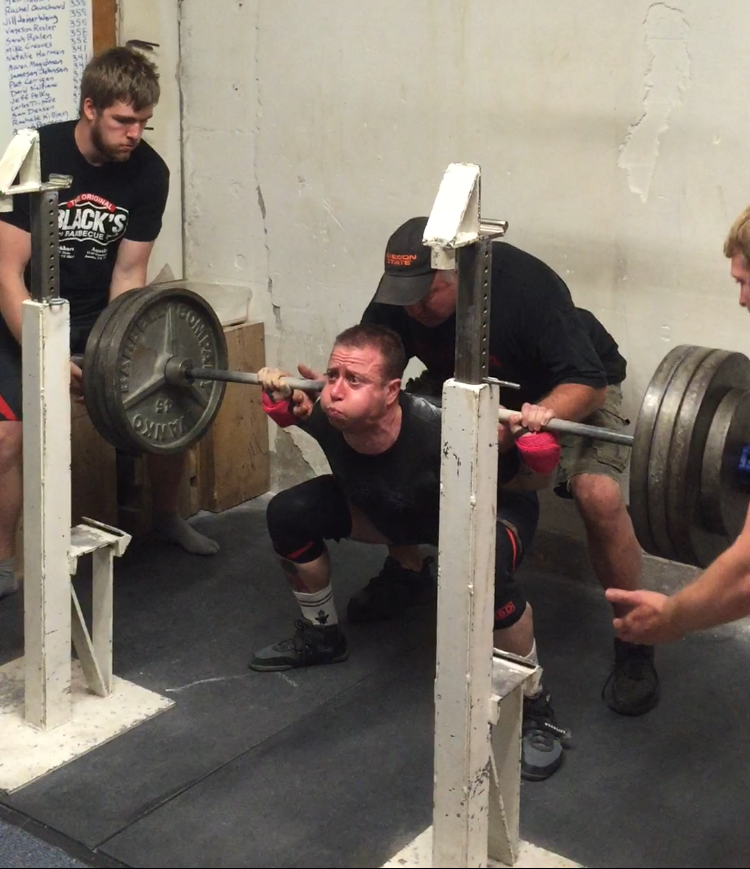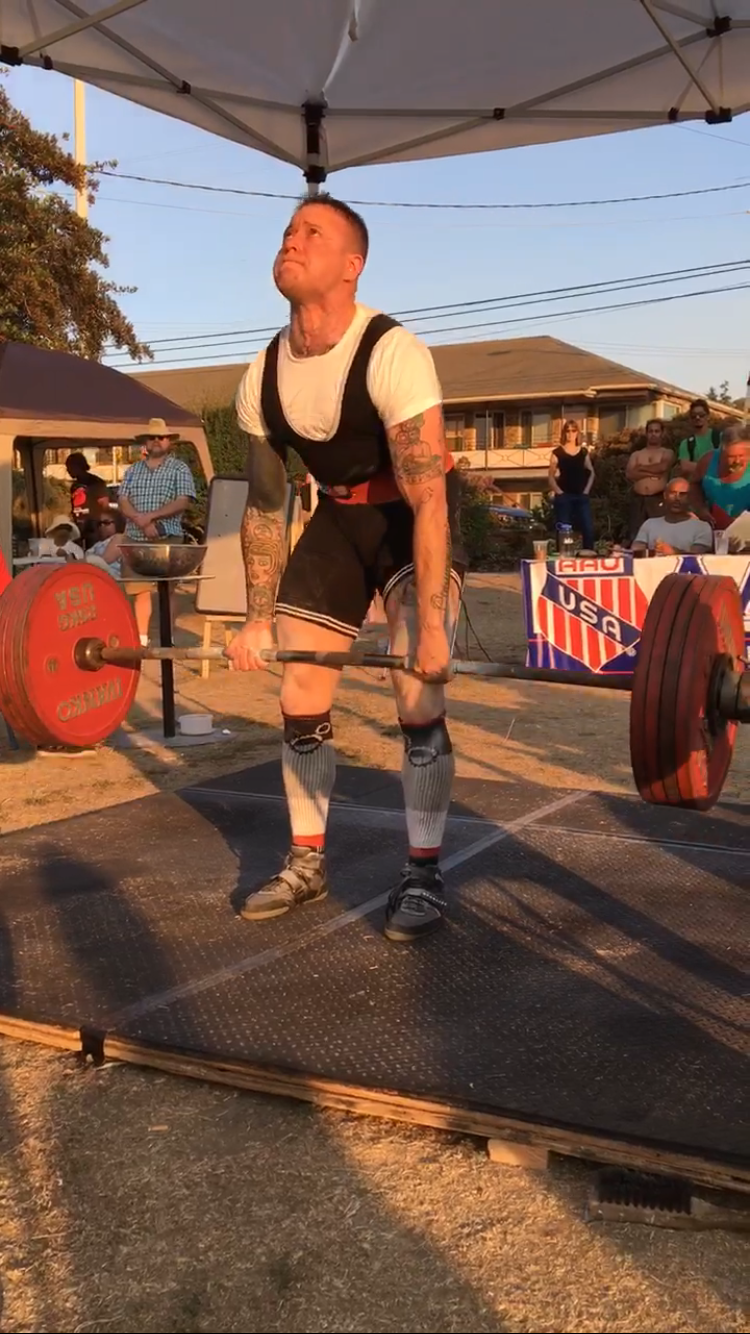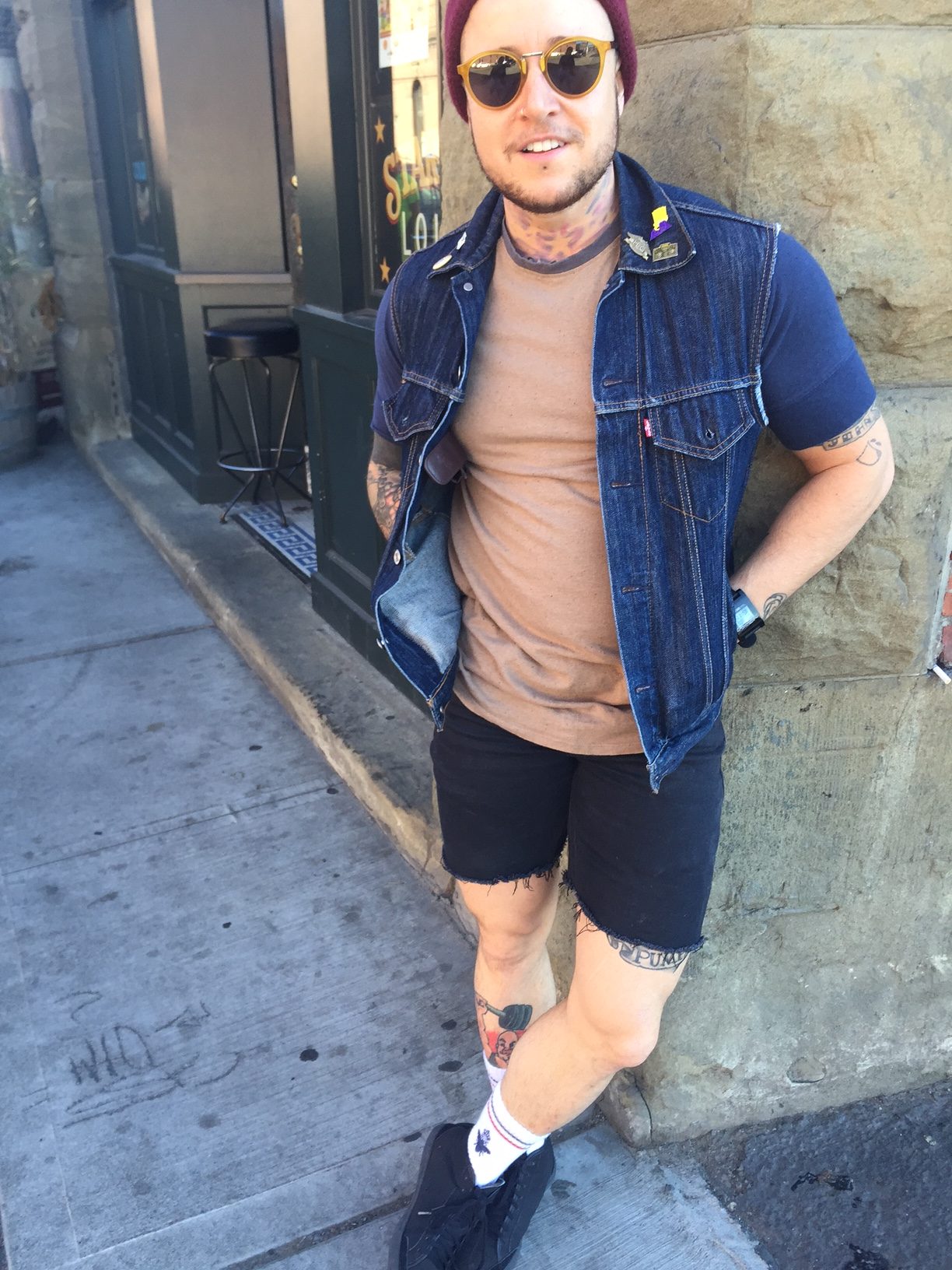The sport of powerlifting has a deeper connection to the transgender community than a lot of other sports. When the record-breaking powerlifter Matt Krocazelski publicly came out as Janae Marie Krocazelski in 2015, she helped to demystify the experience of transgender powerlifters and lay an important foundation for the athletes that were to come after her.
Enter Jens Cinquemani, a Seattle-based, 165-pound class competitive powerlifter who has a combined competition total of 1,062 pounds. Jens is a transgender man — he’s happy for you to call him a “trans dude” if you prefer — and BarBend sat down with him to learn why his transition prompted him to start powerlifting, how his training methodology changed, the legacy of Janae Kroc, and his struggles with being accepted in certain powerlifting federations.

BarBend: Thanks for taking the time to chat, Jens. Before we get started, I want to pre-apologize for any missteps I make – I’ve tried to familiarize myself with trans issues but I am still learning, so please feel free to correct me if you feel comfortable doing so.
Jens: Oh, I’m still learning, too! (laughs)
So, you’re a competitive powerlifter?
I’m a competitive powerlifter.
You have a 501-pound deadlift at 165 pounds bodyweight, that’s pretty impressive.
Right before the meet, I hit 520 in the gym. But didn’t get it at the meet, unfortunately. It was on a beach and it was 90 degrees out and I’d been there for eight hours already, so I was tired.
Which federations do you compete in?
I’d rather it not be published, because I don’t want to incriminate myself regarding testosterone supplementation. But I’m probably going to be switching over to (name of federation withheld by request), because that’s an untested federation.
You mean as far as Performance-Enhancing Drugs?
Yeah. You can choose to be tested if you want to like, break national records and things like that. But I would say it’s more fun there, and I also run into a lot less pushback regarding supplemental testosterone.
That’s something I wanted to ask you about. I assume your transition has involved your taking exogenous testosterone, is that the only hormone you’re taking?
Yes, that is the only thing I’m on.
Does that cause issues when trying to compete as a male powerlifter?
Yeah, it’s been a process. When I first started powerlifting, I got nervous because I didn’t want to make myself look bad or make my coach or teammates look bad by not getting a therapeutic use exemption form with the (names of federations withheld by request), so I wrote to them with a TUE from my doctor and a letter from him telling them what my average levels were, which were actually on the low end of normal. But they ignored me.
So, I wrote to the president of a global federation that oversees one of the federations I was trying to compete in. The president wrote an official letter to say that although he’s not a medical professional, he doesn’t have a problem with my competing. He got me in touch with his federation’s medical director and said I should rewrite to my local federation. I did, and the local federation said I cannot get a therapeutic use exemption for testosterone.
At that point, I’d been wanting to compete for a year and wasn’t able to because I wanted to do it legitimately. So, long story short, I found a different federation to lift with.
So your hormones have been an issue with some federations even though your testosterone levels are actually lower than the average male?
If you look at the rules of the actual Olympics regarding trans people who are allowed to compete, they have to be on supplemental hormones for a certain number of years and have their gonads removed. (Editorial note: gonads can refer to either testes or ovaries.) When I was talking about that to the federations, they told me they follow the Olympic rules. Well, if that’s the case, then I can lift in any federation I want.
So, I think there’s a disconnect. There’s not enough education about what trans means throughout all the federations. And I think if there was, there’d be a lot more people who would want to lift in them, and not be afraid to.
If you look at the rules, I could not find any that made sense for a trans man, such as myself. I think they were trying to keep trans women from competing with cisgendered women because they don’t want competing trans women to have extra testosterone in their bodies. (Editorial note: “cisgendered” refers to a person whose gender identity corresponds with the sex they were assigned at birth. The term is often contrasted with “transgender.”) After all, why would it be necessary for me to not have ovaries to be allowed to powerlift?
But the blanket rule is to have the removal of gonads. It seems like an ignorant position because with trans people, they could go case by case with blood tests, just like they would anyone else with a pee test, you know? That way, trans people people who don’t want to be out to literally everybody could just do a blood test. But I don’t know, I’m not a policymaker.
So, how did you get interested in strength sports?
I had played women’s rugby, which I excelled at. Then, after transitioning, I could no longer play women’s rugby. And men’s rugby, those guys are a lot bigger than I am! I was a little nervous about playing on a men’s team.
So I tried CrossFit, which was OK, but didn’t really play to my strengths. I’m not really good at cardio, I’m not really good at overhead lifting, but I started getting really good at deadlifting. I’d stay late at CrossFit to deadlift, squat, and bench, and then someone was like, “You know, powerlifting is just a squat, a bench and a deadlift, right?” I was like, “Really? I should try that!”
So I found Seattle Strength and Power, run by Todd Christensen, who has been coaching powerlifting for longer than I’ve been alive. He’s a Hall of Famer, he’s a record holder, and it was a really cool environment to be in. So I committed to it.
I’d love to get a sense of the timeline of your transition – medical, social and otherwise – to the extent you feel comfortable talking about it.
I’m 33 now, and I realized I was transgender when I was about 28. I went right to the doctor and told her, and she started me on testosterone pretty much right away. Seattle is amazing like that. After about a year of being on hormones, I told the rest of my friends and family. Then I had chest surgery, and after I started to be more comfortable using male pronouns and my name.
It’s not a huge, amazing story like a lot of people have. It was pretty easy.
That’s interesting. I imagine you’re familiar with Janae Kroc.
Yeah! And I was a huge fan of hers before she transitioned.
She said that out of all of her struggles, including battling cancer, that acknowledging and embracing her transgender identity was the biggest struggle of her life. I was wondering if your situation was similar, but it doesn’t look like it.
No. It’s kind of a weird thing. I was in an open relationship for about five years and my partner was dating a cisgendered man, who was a great guy. But for some reason, I was feeling this jealousy that didn’t have anything to do with my partner dating him. And it was this realization that he was comfortable with who he was and he was a man, and I didn’t know why that made me angry.
After a lot of thinking I realized it was because I’m a man, too. My partner was dating other women, and that was cool with me, but when it was a man I was like, “Wait, no. I should – I’m a man.”
Janae said she stopped powerlifting after she transitioned because, at least in part, she never trained powerlifting as Janae, she trained as Matt. The words she used were, “Not that I couldn’t do that as a woman and train with that same kind of intensity, but it’s just a different aspect of my personality. Totally different goals.”
So she gave it up when she transitioned. Did you ever feel like different aspects of your personality or gender identity were being expressed through lifting?
I think it’s a little different for someone like Janae, because for me it was like the opposite.
It’s really weird to say, but estrogen just kind of sucks. It sucks if you’re a man and it sucks if you’re a woman. It makes you feel emotional, it takes away muscle mass, it puts fat in places you’ve never had before. So I can understand why it would be really hard to grasp that if you’re a transgender female and you’re an athlete.
I’m not saying that was a disadvantage, but when I started taking testosterone, I suddenly started getting shoulder muscles. And I wasn’t even lifting weights! And I had a lot of energy, and I felt good, I could eat a lot more. It was like, “I can do so much stuff right now!”
So honestly, I don’t know if I would powerlift if I’d never transitioned, because it was just so cool to be so strong all of a sudden. Not that I wasn’t strong before, playing rugby, but it was so different.
As far as biological sex goes, I know men and women have some skeletal differences, like pelvis anatomy and some other areas, and there are other differences that I believe are largely attributable to hormones, like body composition and the fact that the male sex carries a larger percentage of muscle mass in the upper body.
So when you started on hormones, you found you gained more muscle size specifically in the upper body? Like, was testosterone all it took?
Yeah. I had muscles all of a sudden. Now, I was no stranger to lifting, I’ve been lifting since I was twelve. But it was like all the hard work I’d been putting in over fifteen years was so minimal, and I was a personal trainer so I knew how to train and I knew the science behind it. I looked OK and I was quite strong.
But when the testosterone started kicking in, it was like, “Whoa, this is why people do steroids.” I would just wake up and have new muscles. It was awesome. I wasn’t trying to be a beefcake but, this was what I was trying to look like for so long. I was definitely trying to masculinize my body, and I guess I didn’t really realize it.
I don’t mean to imply that this is your experience, but I’ve heard from some trans folks that before transitioning they felt disconnected from their bodies a little bit, and after transitioning they felt they had a more intimate relationship with their physicality. Is that something you felt? Not just that you were stronger, but that you were more comfortable with your body, more at home in your body?
A little bit. But I have to say that transitioning made me feel less connected to my body for a while because I didn’t know what was going on. I was a guy, but at first no one else saw me as a guy, I had to tell them. It wasn’t their fault. I still had breasts.
I didn’t know what locker room to use for a while. But once I had my chest surgery and people started seeing me as male, I felt a lot more connected to body. And more excited to see what I could do with it, if that makes sense.
How have you felt in powerlifting gyms, what’s the reaction been like from your fellow competitors?
I went down into Seattle Strength and I said, I’m just gonna tell the coach and whatever his reaction is, it’s no skin off my back. I’ll find another place to work out.
So I approached Todd Christensen and said, “Hey, just so you know, I might need some guidance through which federation to lift for, I’m on supplemental testosterone because I’m transgender.”
And he just said, “Oh, OK. We’ll talk about it later and we’ll figure out what will be the best fit for you.”
And that was it! That shit doesn’t matter to him. There are other gay people down in the gym, both men and women, so that was helpful as well. Not that trans people are gay people, but they’re in the LGBT family, so that was easier.
When some other lifters find out, they’ll say things like, “Oh, you’re really strong for someone who used to have a uterus.” Silly stuff like that. But this gym is a private gym, so if you go down there and act in a certain way you’re not gonna be invited back. So there’s nobody there I’m afraid to tell, because I have the back of my coaches.
And powerlifting’s a small community, a lot of my coaches already knew Janae Kroc. And I really look up to her a lot for paving the way in this specific sport. Because of her, a lot of the male powerlifters I lift alongside already have a trans person they look up to.
At competitions with other gyms I’ve never had the reason or the chance to announce it, but I don’t think it would be a problem. Even after playing rugby, I just think powerlifting is one of the most welcoming sports for anybody. Even people who can only squat 95 pounds are welcome at the same meet as someone who’s squatting 700 pounds. And everyone gets cheered for.
I’m sure there are some issues I haven’t touched on that someone better versed in trans issues would have asked you about. Is there anything else you’d like to say? Anything you always get asked about and you’d like to demystify?
Oh, that’s a hard one.
I know. But a point of this piece is to help educate people about trans athletes and help to build some tolerance and clarity around the subject.
I would say, always remember that just like every person on the street, every person in the world is different, every trans person, everyone has a different experience.
You know that I’m a trans masculine person but you asked how I identified, and you asked to let you know if you misstep and you apologized in advance. That can be kind of tedious for people, but I would say to get over it and just let it be tedious for a while. If you care about somebody, find out what they’re comfortable with and they’ll do the same thing for you.
If I have a frustration it’s that it’s not always a compliment to be really surprised that someone is good at a sport and they’re trans. On dating apps, I’ve been told I’m just as hot as “a real guy” or I have better facial hair than you or bigger muscles than you, and it’s not always a compliment.
Like when people say, “You’re pretty smart for a girl!”
Exactly! Or even, “You’re really strong for a girl” is something women get told in our gym. There are two women who squat over 500 pounds. That’s strong for anyone!
So, those are two things I’d say. Just suck it up and spend an extra couple of minutes asking the right questions and don’t try to compliment people based on their medical history — if they’re trans or not. If you want to compliment someone, just tell them they did a good job.
This interview has been edited for length and clarity.
Images courtesy of Jens Cinquemani. BarBend would like to thank Will Lanier of OutWOD and Sally Tamarkin for helping this interview come together.




